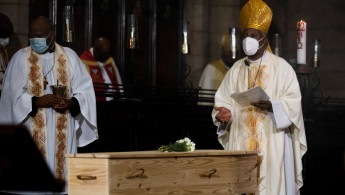Modest requiem for a titan: South Africa bids farewell to Desmond Tutu
South Africa bade farewell on Saturday to Archbishop Desmond Tutu, the last great hero of the struggle against apartheid, in a funeral stripped of pomp but freighted with tears and showered with drizzles of rain.
Tutu died last Sunday at the age of 90, triggering grief among South Africans and tributes from world leaders for a life spent fighting injustice.
Famous for his modesty, Tutu gave instructions for a simple, no-frills ceremony, with a cheap coffin, donations for charity instead of floral tributes, followed by an eco-friendly cremation.
Family, friends, clergy and politicians gathered at Cape Town's St. George's Cathedral where, for years, Tutu used the pulpit to rail against a brutal white minority regime. That is where he will be buried.
"We thank you for loving our father... because we shared him with the world, you share part of the love you held for with us, so we are thankful," said Tutu's daughter Mpho.
President Cyril Ramaphosa, who will deliver the eulogy, accorded Tutu a special category funeral, usually designated for presidents and very important people.
He was to hand South Africa's multicoloured flag to the "chief mourner", Tutu's widow, Leah -- a reminder of her husband's description of the post-apartheid country as the "Rainbow Nation".
South Africa has marked a week of mourning, with several thousand people, filing past a diminutive rope-handled casket made of pine, adorned by a plain bunch of carnations.
Under a grey sky and drizzle, mourners were ushered into the cathedral. Rains, according to historian Khaya Ndwandwe "are a blessing" and show that Tutu's "soul is welcome" to heaven.
Mourners included close friends and family, clergy and guests, including former Irish president Mary Robinson, and Nelson Mandela's widow Graca Machel -- with both reading prayers.
Others mourners were Elita, the widow of the last apartheid leader FW de Klerk, who died in November.
Conspicously absent from the funeral is one of Tutu's best friends, the Dalai Lama. He failed to travel due to advanced age and Covid restrictions, his representative Ngodup Dorjee, told AFP outside the church.
Tutu's longtime friend, retired bishop Michael Nuttall, who was Anglican Church dean when Tutu was the archbishop of Cape Town, delivered a sombre sermon.
"Our partnership struck a chord perhaps in the hearts and minds of many people: a dynamic black leader and his white deputy in the dying years of apartheid; and hey presto, the heavens did not collapse," said Nuttal.
"We were a foretaste,...of what could be in our wayward, divided nation".
The two forged a strong relationship, illustrating for many how a white leader could work for a black leader. Nuttall went on write a memoir titled "Tutu's Number Two" about their friendship.
Fighter
Under apartheid, South Africa's white minority cemented its grip with a panoply of laws based on the notion of race and racial segregation, and the police ruthlessly hunted down opponents, killing or jailing them.
With Nelson Mandela and other leaders sentenced to decades in prison, Tutu in the 1970s became the emblem of the struggle.
The purple-gowned figure campaigned relentlessly abroad, administering public lashings to the United States, Britain, Germany and others for failing to slap sanctions on the apartheid regime.
At home, from his pulpit, he slammed police violence against blacks, including the gunning down of school students during the 1976 Soweto uprising. Only his robes saved him from prison and were a shield from police brutality for many protesters.
Humour
After apartheid was dismantled and South Africa ushered in the first free elections in 1994, Tutu chaired the Truth and Reconciliation Commission, which exposed the horrors of the past in grim detail.
He would later speak out fearlessly against the ruling African National Congress (ANC) for corruption and leadership incompetence.
Tutu's moral firmness and passion went hand-in-hand with self-deprecatory humour and a famously cackling laugh.





 Follow the Middle East's top stories in English at The New Arab on Google News
Follow the Middle East's top stories in English at The New Arab on Google News


